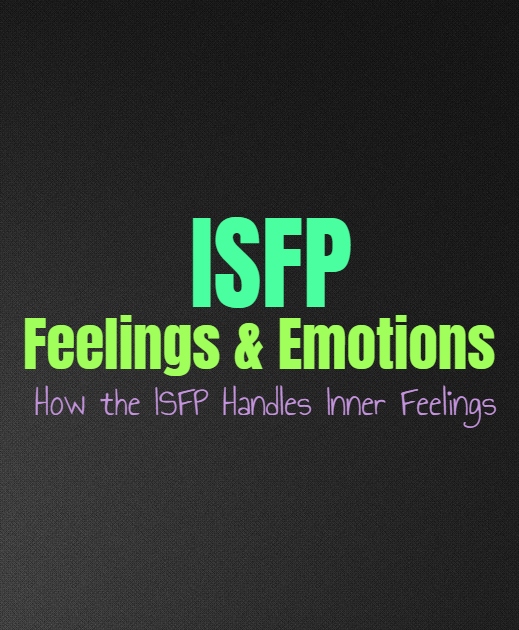ISFP Feelings & Emotions: How the ISFP Handles Inner Feelings
For each personality type, feelings and emotions are an important part of life, but each person processes and responds to them differently. For the ISFP, inner emotions are definitely important and something they often value above other things. For them, their inner emotions are not something to be neglected or ignored, and these often play a large role in who they are. For the ISFP, this isn’t just about their feelings and desires. It is also connected to their morals and personal beliefs.
Their Dominant Function
The dominant function of the ISFP is their introverted feeling (Fi), which focuses on their own internal emotions and morals. They focus inward to make decisions and come to conclusions about what they see around them. When the ISFP experiences something, they want to filter this through their own internal emotions, and this is often a major reason why they need time to themselves. The ISFP needs to take time to process their own feelings in response, as this helps them come to conclusions about the situation. They don’t want to base their decisions and feelings on what someone else says, so for the ISFP, taking this time is important. Their internal emotions help to guide the ISFP in life and help them make choices that are based on who they are inside.
This is why ISFPs have strong inner morals since this comes from their introverted feeling. They spend time sifting through their thoughts and feelings and come to conclusions that are grounded in themselves and who they are. This is why those morals are so important to the ISFP and why it can be frustrating when someone attempts to challenge this. They understand people are going to disagree with them. They simply don’t have patience for people who forcefully attempt to change their minds. ISFPs can be seen as stubborn because of this, but going against these morals and beliefs means going against who they are as a person and what they truly believe in. ISFPs strive to uphold these inner morals even if it is difficult or if other people don’t understand their reasoning. For the ISFP shying away from this means abandoning who they are, and this would lead to some serious confusion and stress in their lives. For the ISFP, it is best to hold onto these inner beliefs, especially when they have spent a lot of time trying to understand themselves and what they believe in and desire.
They Can’t Just Neglect Their Feelings
Some people find it easier to bury their emotions inside, but ISFPs don’t feel comfortable with this. Trying to ignore and neglect their own inner emotions is almost impossible. An ISFP who does attempt this is going to end up rather unhappy and likely feel in a constant state of stress. ISFPs need to be able to express themselves and spend time focusing on their own inner emotions. Without paying attention to what they are feeling, the ISFP is certainly going to lose connection to who they are. Simply neglecting their emotions or seeking to bury them is definitely going to cause immense stress for the ISFP. They will feel these emotions continuously bubbling up, and they likely won’t be able to run from them for long.
When the ISFP is around people who attempt to stifle them and their feelings, they are going to be miserable. They need freedom and complete space to be themselves without constant judgment. ISFPs need to express their feelings in a completely honest and open manner, even if people might not like this all of the time. This doesn’t mean ISFPs are consistently sharing their feelings in a blubbering manner. They simply need to feel the freedom to express themselves when it is important and meaningful. For the ISFP having this sense of openness really helps them to be themselves without constant fear. They need to be free to express what they are feeling and thinking when the time comes for them to do so. Stifling these emotions and pretending they aren’t there is not natural for the ISFP and leaves them feeling lost and confused. These inner emotions will find ways to expose themselves, and if the ISFP doesn’t pay attention, they will come out in more toxic ways. The more the ISFP develops their inner morals and pays attention to their feelings, the healthier and more adjusted they will be in their daily lives.
They Also Care About the Emotions of Others
While ISFPs might be more naturally in tune with their own feelings, this doesn’t mean they cannot connect with others as well. While it might not be as easy for them to fully empathize, ISFPs do care about the people around them. Since they feel things deeply, this can help them appreciate when someone else is going through something. They often try to connect this with their feelings and experiences, hoping to understand someone better. ISFPs want to be supportive people, often making them great listeners. They are there for the people they love and won’t try to stop them from expressing their emotions.
For the ISFP logic is important, but not nearly as important as having a strong sense of morals. They believe in following their own heart, even if it doesn’t always make sense to others. For the ISFP, these inner emotions are more valuable and meaningful and should not be ignored for the sake of cold hard facts. To them, these facts are often used as an excuse to hurt people, and this is not something the ISFP is supportive of.
This Post is Brought To You By BetterHelp
